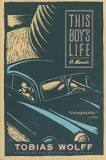“This Boy’s Life” by Tobias Wolff

This Boy’s Life by Tobias Wolff was recommended to me a while ago on one of The Morning News Biblioracle events, where I listed the last five books I read, and John Warner offered a suggestion for the next. I am far, far from whenever that suggestion came, and perhaps it would have been more timely then, but it seemed timely enough, coming on the heels of my finishing, liking and appreciating Jeannette Walls’ childhood memoir The Glass Castle.
Also, since you may be wondering, it was adapted into a movie with Ellen Barkin, Robert DeNiro and Leo DiCaprio.
Toby, or Jack, since he changes his name within the book, lives in the west with his mother, who is divorced from his dad, who lives out east with their son Geoffrey. The mother, Rosemary, has a penchant for getting up and going. Interestingly, she shares this tendency and a name with Jeannette Walls’ mother, so there was an interesting fun-house mirror effect to reading these books one after the other.
Where Jeannette was a sympathetic narrator, though, Toby/Jack is not. He lies, he steals, he plays with guns. He is sympathetic in that he has to endure two abusive father-ish figures in a row: Roy, then Dwight, who becomes Toby’s stepfather. So his deliquency is his survival mechanism. And Tobias the author doesn’t paint his younger self in a flattering light. Like Walls and other memoirists, he presents a portrait of his childhood, one that we are supposed to read as more or less true. It’s a rough one, without the abject poverty of Walls’, but without the intermittent glimmers of love and joy, too.
Dwight drove in a sullen reverie. When I spoke he answered curtly or not at all. Now and then his expression changed, and he grunted as if to claim some point of argument. He kept a Camel burning on his lower lip. Just the other side of Concrete he pulled the car hard to the left and hit a beaver that was crossing the road. Dwight said he had swerved to miss the beaver, but that wasn’t true. He had gone out of his way to run over it. (88)
Like Walls, Wolff is a storyteller, and the tale of his childhood is a compelling one, if often uncomfortable to read. Towards the end, when Toby tries to get out, it was much more complicated to root for him, given the machinations he went through to orchestrate his potential escape from small town Washington State. But since we know he DID escape–since he’s a published author, and a professor of writing, it’s also fascinating to see the beginnings that ended up somewhere quite different.